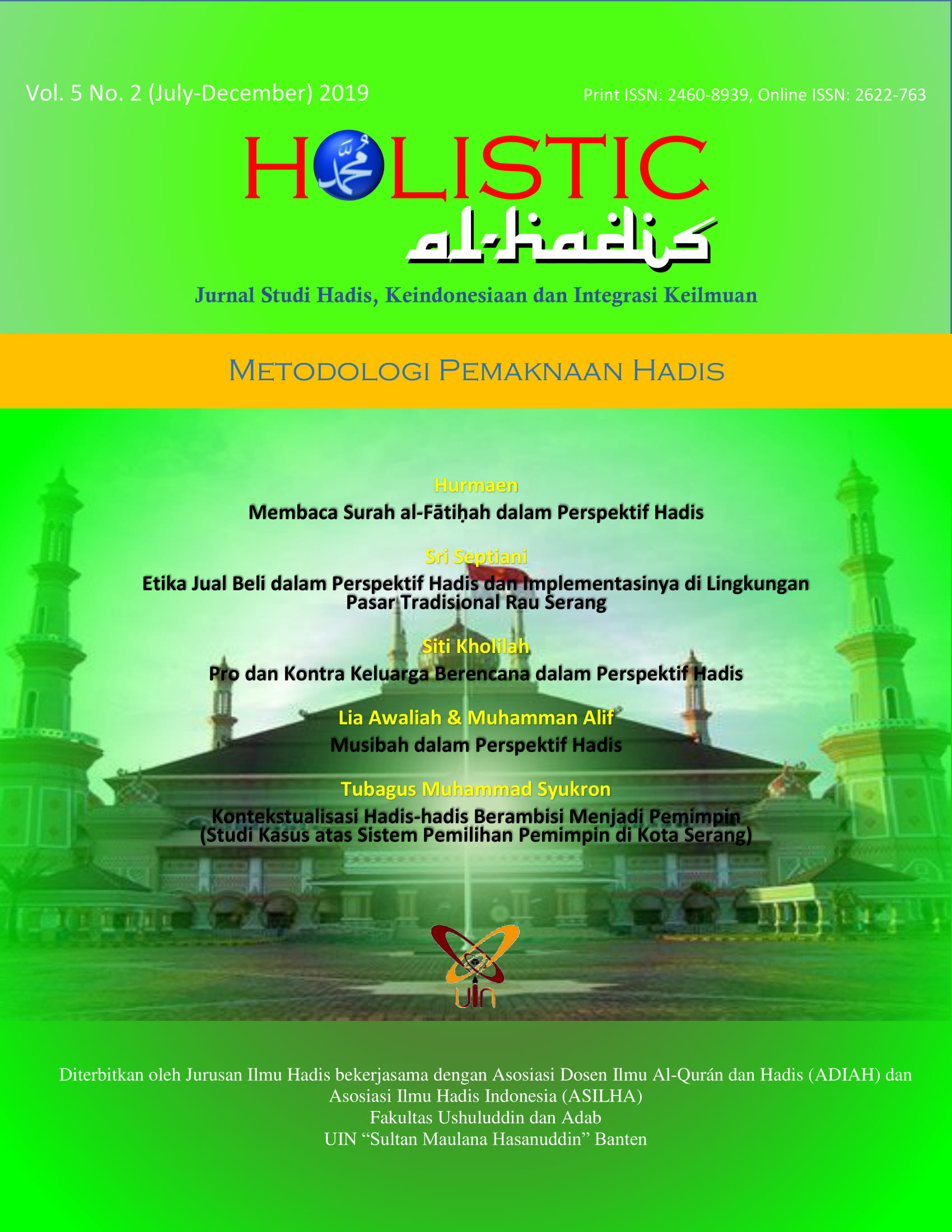Kontekstualisasi Hadis-Hadis Berambisi Menjadi Pemimpin
(Studi Kasus atas Sistem Pemilihan Pemimpin di Kota Serang)
DOI:
https://doi.org/10.32678/holistic.v5i2.3215Keywords:
Demokrasi Pancasila, Kontekstualisasi Hadis, Kritik MatnAbstract
Contestation of the election of both heads of regions in Indonesia as a democracy of Pancasila, as happened in Serang city indicate that there is an attempt to ask for the position of a head of regional office to the people as the highest sovereign. In fact, in view of the Prophet's hadiths, asking for a position more ambitious to become a leader is prohibited. This raises a problem for the people of Indonesia, the largest Muslim country in the world, because there is a conflict between the norms of state law and religious norms.
With regard to this, raises the following question: 1. How is the phenomenon of leader election in Serang city? 2. How does the analysis of hadiths ambitious to become leaders? 3. How does contextualization of hadiths of ambitiously becoming leaders against the process of electing leaders in the city of Serang? In answering the problem, the author used a mixed method between library research and field research by applying contextual analysis of Hadith Syuhudi Ismail theory which is based on the theory of Yūsuf Qarḍawi.
Contestation of the election of both heads of regions in Indonesia as a democracy of Pancasila, as happened in Serang city indicate that there is an attempt to ask for the position of a head of regional office to the people as the highest sovereign. In fact, in view of the Prophet's hadiths, asking for a position more ambitious to become a leader is prohibited. This raises a problem for the people of Indonesia, the largest Muslim country in the world, because there is a conflict between the norms of state law and religious norms.
With regard to this, raises the following question: 1. How is the phenomenon of leader election in Serang city? 2. How does the analysis of hadiths ambitious to become leaders? 3. How does contextualization of hadiths of ambitiously becoming leaders against the process of electing leaders in the city of Serang? In answering the problem, the author used a mixed method between library research and field research by applying contextual analysis of Hadith Syuhudi Ismail theory which is based on the theory of Yūsuf Qarḍawi.
This study aims: 1. To describe the phenomenon of leader election in Serang city, 2. To understand the analysis of hadiths ambitious to become leaders and 3. To understand the contextualization of hadiths of ambitiously becoming leaders against the process of electing leaders in the city of Serang.
The results of this study indicate that legal norms accompanied by phenomenon in the election of mayor and vice mayor of Serang 2018 are not contradictory to the result of contextual analysis of the hadiths ambitious on becoming leader as long as there is a real public good reason, bringing a good impact if occupied by the party requesting the position, the offer or the possibility of vacancies that can be taken with the purpose of common good with the ability and ability to carry out the mandate of the position well and not in the framework of pride.
Downloads
Downloads
Published
Issue
Section
License
Authors who publish with this journal agree to the following terms:
-
Authors retain copyright and grant the journal right of first publication with the work simultaneously licensed under a Creative Commons Attribution License that allows others to share the work with an acknowledgement of the work's authorship and initial publication in this journal.
-
Authors are able to enter into separate, additional contractual arrangements for the non-exclusive distribution of the journal's published version of the work (e.g., post it to an institutional repository or publish it in a book), with an acknowledgement of its initial publication in this journal.
-
Authors are permitted and encouraged to post their work online (e.g., in institutional repositories or on their website) prior to and during the submission process, as it can lead to productive exchanges, as well as earlier and greater citation of published work (See The Effect of Open Access).


















